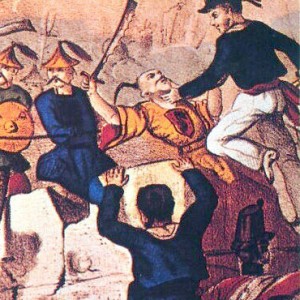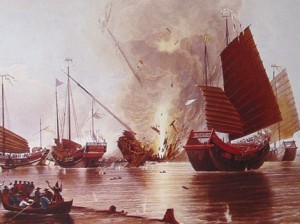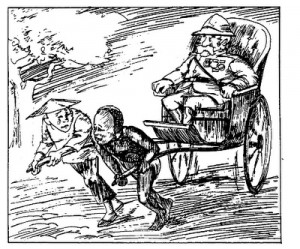These guys just can’t help themselves.
 The mercenary lobby’s latest attempt to improve its image as an industry (officially known as the Journal of International Peace Operations) fails once again, spectacularly.
The mercenary lobby’s latest attempt to improve its image as an industry (officially known as the Journal of International Peace Operations) fails once again, spectacularly.
Yes, according to Peace Ops columnist Gary Sturgess, the heavily armed Anglo drug cartel that brutally subjugated much of Asia offers “a model of corporate governance” to which today’s armed humanitarian can look for helpful lessons.
No one today would disagree that the British should have stuck to trading… However, we can condemn imperialism and still ask whether a private corporation did a reasonable job of building and managing a nationstate.
Hey, maybe the East India Company wasn’t so bad after all!
Sturgess continues with selective quotations from archaic sources that support his preconceived conclusion, ignoring a wide body of serious scholarship on the lasting damage wrought by British imperialism in order to highlight the dubious benefits of rule by enlightened foreign corporations:
In the early years, it was atrocious. The Company’s servants…abused public authority for private gain…
[But in] some ways, the Company made for a better government precisely because it was a private corporation.…
Such a system of government is, of course, unthinkable in the modern world. Yet the East India Company provides us with a fascinating insight into the evolution of a trading corporation into a professional public administrator that was able to overcome many of the conflicts between public duty and private interest.
Indeed, the legacy of the East India Company is nothing if not fascinating. Look at how it established law and order in the colonies…
 How it opened new markets…
How it opened new markets…
 How it provided jobs to the natives…
How it provided jobs to the natives…

Remember, this gallingly revisionist take on British colonial history appeared in the trade journal of America’s private force of overseas “nation-builders.” Its readership is nothing if not influential. As another writer points out elsewhere in the issue,
[T]he contingency contracting industry functions as a de facto mechanism of U.S. foreign policy. Policy planners in the U.S. government codify the industry’s existence in its formal planning processes…[w]hile the industry continues to establish an air of permanence…”
And yet, could its membership be more tone deaf?
These are the people to whom the US government is effectively outsourcing governance of Iraq and other “post-conflict” zones. If they’re trying to crib from the East India Company’s playbook, the rest of us should be worried.